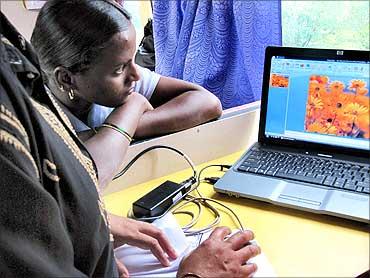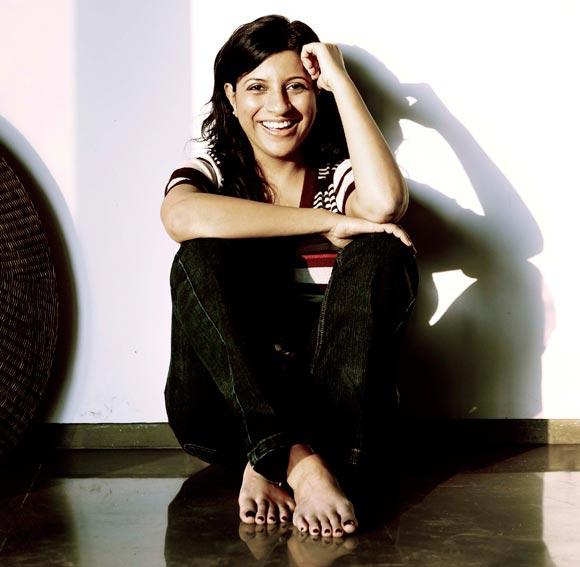 | « Back to article | Print this article |
When Kiran Rao was mistaken for a stuggling actress
From inspiring stories of women who have carved a niche in their career to differently-abled women who fought against social and psychological barriers, the CII event was an eye-opener to the fact that India still has a long way to go towards women empowerment and threw up some very fascinating stories.
At the Confederation of Indian Industry held in Mumbai to celebrate the 'New Indian Woman,' which was attended by eminent personalities from sports, film, media and politics, actor Shabana Azmi emphasised on the remarkable achievements made by women in the respective fields.
Some of those who made their presence felt at the event were actor Nandita Das, directors Zoya Akhtar and Kiran Rao, journalists Barkha Dutt, Nidhi Razdan and Munizae Jahangir, advocates Menaka Guruswamy, Supreme Court of India and Kanchan Pamnani who is also a disability activist and Solicitor, Supreme Court of England among others.
While Nidhi Razdan spoke of how women journalists juggle between odd working hours and miss out on a healthy social and family life, Kiran Rao spoke of the challenges she faced when she started her career as an assistant film director in the late 90s.
Popular Indian transgender activist Lakshmi Narayan spoke of discrimination against the third gender, and lauded the courage of Dr Anita Ghai, associate professor, Jesus and Mary College who was determined to succeed in life despite being identified with polio at the age of two.
The CII event also touched upon the issue of male dominance in certain sectors, the slow but gradual shift in society's attitude towards women who want to make a mark and several other issues--social and psychological that impact women.
Nithya Ramani spoke to Kiran Rao, Zoya Akhtar and Nandita Das to find out what they had to say.
Please click NEXT to continue reading
'The new Indian woman is confident and secure'
When Kiran Rao first stepped into a director's office saying that she wanted to work in films, she was asked to bring in her photographs.
Although Rao mistook it to be passport photographs then, it was only later that she realised that she was mistaken for an aspiring actor.
"Probably, no woman had come to work there as an assistant director. But there can always be a first," she says.
Rao, who voted strongly in favour of reservation for women in the Parliament said that women were deprived of empowerment in several sectors and one should look at reservations as incentives to help them step forward in life. Excerpts:
How do you define the new Indian woman?
I think the new Indian woman is confident and secure, knowing that she can be anything she wants to be and not let people stand in her way.
We should reach out and take what we want and what we deserve. If we want be at home and look after our family, that's fine too. Being a full time homemaker is also a tough job. It is important that women should have options and choices.
Do you think women need reservations to be successful in their careers?
In the Parliament, I do think women need reservations. Until there comes a time when women can compete in the same level as men, there should be mandatory employment for women as that will give them confidence.
What are the three skills, you think, women must develop in them to be successful in their career?
It depends on what she would like to do. Whatever she wants to do, she should be able to communicate. She must have a strong mind and be sensitive.
What career advice would you like to offer to the class of 2012?
Do what you think you are good at and not what you think will earn you money. If you put your heart and soul into what you are good at, I am sure you can make a living out of it.
Video: Hitesh Harisinghani
'India is a land of contradictions'
Actor Nandita Das' film career started with a controversy.
Her first film Fire was based on homosexuality--a subject that was perhaps too bold for the Indian audience.
However, 16 years and several national and international awards later, the actor-turned-director can only hope that people's attitude towards new age cinema changes for the better. Excerpts:
How will you describe the new Indian woman?
I think it is very difficult to describe the new Indian woman because everybody -- in city and in villages -- is changing and going through the transitions. India is such a diverse country with so much complexity that I don't think you must simplify to define the new Indian woman.
What changes do you think the industry has gone through in the last few years?
India is a land of contradictions and the best and the worse things can all happen together.
You can see more women in the work force speaking up but at the same time, there is female feticide and female infanticide and there are villages where you can't find a single woman.
The irony is that this is not the poor section of the society that is doing this. The elite class are the ones finding out the sex of the child and bringing down the sex ratio in our country.
India is a country of the richest and the poorest, the most conservative and the liberals and any attempt to narrow it down is a fallacy.
Do you think women need reservations to be successful in their careers?
People perceive reservations as a bad thing. It is an affirmative action. It is because women have been left behind while they deserve to be given a chance to speak up. That is why we do need reservations till the time when we are perfect and reservations will not be needed.
Do you think banning the telecast of The Dirty Picture on TV is a threat to freedom?
I am against banning of anything. We live in a democratic country and lots of things will come that people won't like, I won't like; but there are ways of expressing your views. I remember the time when Fire was released. Physically tearing up the posters and stopping people from going to the theatres to watch the movie is not a mark of a mature and democratic society. As far as cinema is concerned, you must have ratings, like the West, where you show that the film is suitable for only those of a certain age.
What are the three skills, you think, women must develop in them to be successful in their career?
I think she should be confident, have clarity in dream and must believe in hard work.
What career advice would you like to offer to the class of 2012?
Have some conviction of what you want to do. Explore life more, expand your interest and if you follow what you really want to do, you will sure excel in it.
Video: Hitesh Harisinghani
'There are people putting up their wives and make them act as puppets'
Zoya Akhtar will never use an item song to promote her films unless the script demands it.
At the same time, she feels audiences should not complain about a story, subject or character of a film without taking into account the perspective or intent of the film maker. Excerpts:
Do you think Indian women are inspired by reel-life characters?
I can't say for sure. I don't watch television, but I have been told that most women identify with the characters they see on TV.
Has your being a woman ever affected your career as a film director?
I never felt differently. Besides, I don't think of my gender while directing a film, so I guess it doesn't affect me. But yes, when I was directing Farhan (Akhtar), after every shot, the cameraperson would come up to us and discuss the scene with Farhan while I was still there.
Probably, he seemed to forget that I was the director of the film. I just had to remind him once and since then I never faced any problem on the set.
We work as a team. 60 per cent of Farhan's team comprise women. So, gender really doesn't matter.
Do you think women need reservations to be successful in their careers?
It is difficult to say if reservations are necessary.
In today's world, where women consider themselves equal to men, they might not want reservations. But in the Parliament, it is important to have reservations as women can change.
I am not a great believer of reservations but if sometimes if you don't get it, you have to fight for it. I don't know what the pros and cons of that are but there are people putting up their wives and make them act as puppets.
What are the three skills, you think, women must develop in them to make themselves employable in today's world?
A film director does not need the same skills as that of a doctor. She has to know what she wants, stand by it and educate herself fully in that field and go our there and live her dream.
'There has to be a happy marriage between what you can and what you want to do'
Lyricist Javed Akhtar did not seem like a misfit among the huge crowd of women who attended the event in Mumbai.
Just as much as he praised the efforts of women, he also pointed out at the hypocrisy of the government that has spent years debating and criticising the bill that can bring an affirmative change in society and impact many lives. Excerpts
Do you think women need reservations to be successful in their careers?
There are different kinds of reservations in the society. You have reservations for schedule caste, schedule tribe, backwards and OBCs.
There are other kinds of reservations like for ladies in the local trains and buses. If one can justify these reservations, it is applicable for reservations in the Parliament as well.
What are the three skills, you think, women must develop to be successful in their careers?
If you are talking about a woman who wants to get into the film industry as a director, she must preferably join a film institute in India or abroad and educate herself and learn film techniques and direction. She can also shadow any competent director as an assistant and take full time hands-on experience while on the job.
What career advice would you like to offer to the class of 2012?
One has to be clear as to what s/he wants to do.
Doing something off beat is fine as long as you know what to do.
If you want to do something just for the sake of doing something different, then you are a confused person.
There has to be a happy marriage between what you can and what you want to do. If that combination is achieved, then focus on it and pursue it.
Video: Hitesh Harisinghani


